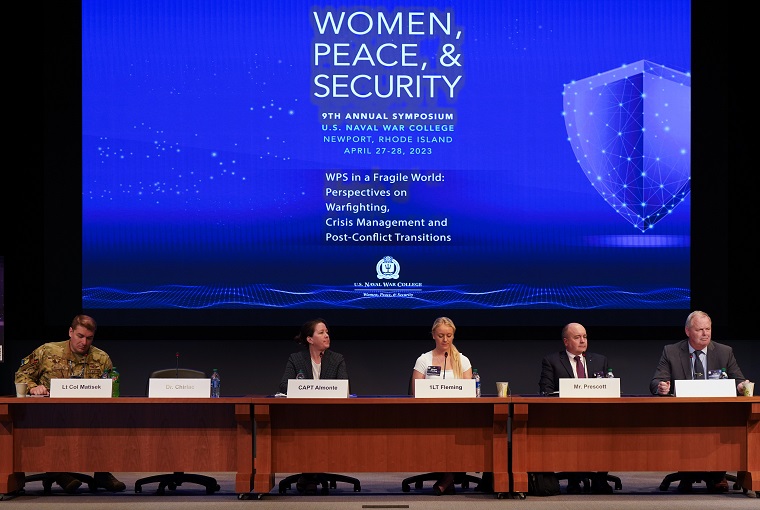U.S. Naval War College Hosts 9th Women, Peace, and Security Symposium

Newport, R.I.– The U.S. Naval War College (NWC) hosted the 9th iteration of its Women, Peace, and Security (WPS) Symposium, April 27-28. The event titled “Women, Peace, and Security in a Fragile World: Perspectives on Warfighting, Crisis Management and Post-Conflict Transitions” was aimed at fostering a shared understanding of the complex and dynamic global security environment through examination of women’s influence and experience as stakeholders and catalysts of change alongside men.
The event provided approximately 500 U.S. and international in-resident students and 350 faculty members the opportunity to dialogue with 150 WPS subject matter experts from the U.S. Department of Defense, Department of State, Department of the Navy and other service branches, other professional military education (PME) institutions in the U.S. and Canada, and scholars and representatives from partner nations around the world.
Welcoming the participants, NWC Provost Stephen Mariano, Ph.D. noted that including women in peace and security dialogues is essential for diverse perspectives at the War College. Mariano also stated that promoting women’s meaningful participation at varying levels, including leadership, is key to achieving innovative, enduring, and sustainable solutions.
A keynote presentation on WPS as a critical tool for advancing national security by Michelle Strucke, deputy assistant secretary of defense for Global Partnerships, highlighted the inspiration and commitments underpinning the U.S. Department of Defense WPS Strategic Framework and Implementation Plan (2020), as well as its relationship to the U.S. National Defense Strategy (NDS).
“We believe WPS is the right thing to do,” Strucke stated. “But it is also the effective thing to do to make us more capable and more operationally relevant, able to meet the many challenges of our moment.”

Saira Yamin, Ph.D., the Ambassador Swanee Hunt Chair of Women, Peace, and Security at NWC also affirmed the importance of WPS as a global security initiative led by the United Nations, emphasizing the role of the United States as the first and only country to have codified WPS into law. The Women, Peace, and Security Act of 2017 mandates that the U.S. "should be a global leader promoting the meaningful participation of women in conflict prevention, management, and resolution, and post-conflict relief and recovery efforts.”
“But this is a vision,” Yamin emphasized. “It is up to us to fulfill it; we are the bearers of the torch.”
As such, NWC is empowering its students to transform that vision into reality. Yamin identified the symposium as a forum for advancing a shared understanding of WPS among NWC students to help them understand the relationship of the policy framework to national and international security.
Lt. Cmdr. Jason Burroughs, former aide to Secretary of the Navy Carlos Del Toro and a current student at NWC, says that he was excited about having the opportunity to hear a variety of perspectives on the role of WPS throughout history and in different contexts.
“I think about going to a ship after NWC and what I, as a unit leader, am going to share with my wardroom,” Burroughs said. He also remarked that the symposium challenged him to consider ways to communicate WPS’ significance at a tactical level to his subordinates as they continue to grow as leaders.
Symposium attendees participated in eleven panels supported by over fifty speakers covering topics such as women waging war in the Asia-Pacific region, women in combat roles in the United States, women in leadership, the gender perspective in strategic plans and operations, women’s meaningful participation in peace and security initiatives, and operationalizing WPS in post-conflict contexts.
Senior Ambassador Eric Nelson, associate director, George C. Marshall European Center for Security Studies, Garmisch-Partenkirchen, Germany indicated that he was inspired by the many stories about why WPS matters and why it is a fundamental challenge. He states that knowledge gained from the symposium will fortify the Center's efforts to better integrate WPS and gender factors into everything it teaches.
“We attend symposia like this one to understand how others are approaching this issue and excelling at it,” Nelson said, adding that information received adds depth to the faculty in terms of added expertise [on human security]. Brig. Gen. Fadzillah Binti Abdullah, director general for Defense Training Department, Malaysian Armed Forces remarked that she agreed, repeating another comment from a panel representative: “‘You can’t implement what you don’t know.’”
Symposium afternoon sessions also provided NWC faculty members an opportunity to participate in workshops geared toward providing them access to pedagogical strategies and information for advancing the WPS agenda within their specific areas of expertise.
Col. Steve Shinkel, professor and senior Air and Space Force advisor to the president of NWC, says that, for him, the value of the conference included gaining insight into how other PME institutions, both nationally and internationally, are integrating WPS into their programs.
“Additionally, the workshops offered teaching strategies as well as ideas on how to better approach the subject in the classroom,” Shinkel commented, adding that the connection it provided to resources by way of contacts was absolutely vital. “Having different experiences to draw upon aids the integration process.”
At conference end, Rear Adm. Shoshana Chatfield, president of NWC, offered that the Navy is about high-performing teams and transposed Gen. Jacqueline Van Ovost’s - commander of U.S. Transportation - thoughts on the WPS mission: “When we get beyond the ‘first and only,’ we will be left with a professional military ready to get after the needs of the nation with highly talented, diverse, and capable people before us, beside us, and behind us.” “That,” Chatfield said, “is exactly what the WPS agenda seeks to achieve.”
Since the inception of the first U.S. National Action Plan on WPS in 2011, NWC continues to be a military academic leader in the field, dedicated to mainstreaming WPS subject matter throughout its curriculum and integrating it in faculty research and community outreach. Knowledge shared through a number of scholarly and practitioner-centered presentations at the WPS Symposium will be published in the form of an edited volume to benefit students and faculty, as well as other PME institutions in the U.S. and partner nations.
NWC delivers excellence in education, research, and outreach, informing today’s decision-makers and educating tomorrow’s leaders. The college provides educational experiences and learning opportunities that develop students’ ability to anticipate and prepare strategically for the future, strengthen the foundations of peace, and create a decisive warfighting advantage.
